
Yamaha speaks out against outboard use by people smugglers following BBC report
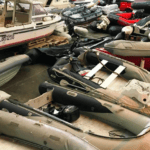
Yamaha Motor UK has spoken out against people trafficking after a people smuggler expressed his preference for using the company’s outboards for trips across the channel.
In an undercover operation, a BBC journalist posing as a Syrian man trying to get to the UK made contact with people smugglers and in the course of his investigation was told by a man (purportedly named Abu Sahar) that he “loves” Mercury outboards, although “if there is Yamaha, I prefer Yamaha”.
The PR issue for Yamaha and Mercury (which has been asked to comment) comes as official figures from the Home Office reveal more than 25,000 people had crossed the English Channel in small boats by around 23 September 2024.
A provisional total of 25,052 was reached in September – the figure is higher than that for the same timeframe last year, but lower than in 2022.
Over 50 people have already died this year attempting the crossing. IOM Missing Migrants project suggests that there are 1,230 missing migrants in Europe since 2014 – although these are not all linked to the Channel crossings.
The BBC’s journalist contacted Sahar via the migrant community.
Boats and lifejackets for people smuggling come via Turkey
“The equipment comes from Turkey” reports the journalist who met the people smugglers in Essen, West Germany although this refers to the dinghies and lifejackets and not the outboards. “They have about ten warehouses around Essen.”
Smugglers are moving boats from Turkey to Germany where they are stored before the channel crossings. NCA (the UK’s National Crime Agency) confirms that Germany’s a central location for storing dinghies later used in channel crossings because cities like Essen are near the Calais region’s watched beaches.
Lifejackets offered by people smugglers not fit for purpose
Earlier this year (12 September 2024), NCA officers and European partners seized around 600 dangerous lifejackets destined for people smugglers and their cargo.
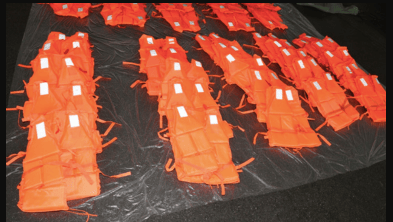 Courtesy of NCA
Courtesy of NCANCA says the jackets do not meet UK or European safety standards and would not have worked in deep water. They were in a lorry that was intercepted by the Dutch Royal Marechaussee (KMar) in the city of Zwolle. The load was initially shipped into Italy before being transported to the Netherlands.
“Tackling organised immigration crime remains a priority for the NCA, and we are looking to disrupt the criminal gangs engaged in that in any way we can – that includes targeting their supplies of dangerous maritime equipment,” says NCA regional head of investigations, Jacque Beer.
“The seizure was the direct result of NCA working closely with European partners to stop and seize this consignment.
“There is no doubt that this unsuitable equipment had been acquired by criminal networks who intended to use it for small boat crossings.
“These life jackets do not conform with any kind of safety standard, would not have provided protection in the sea, and they would only have been used to dupe those paying for crossings into thinking they were safe when they were not.
“Some of them were in children’s sizes, again showing the callous nature of those involved. Tragically, we have seen only recently how they don’t care about risking the lives of those they transport.”
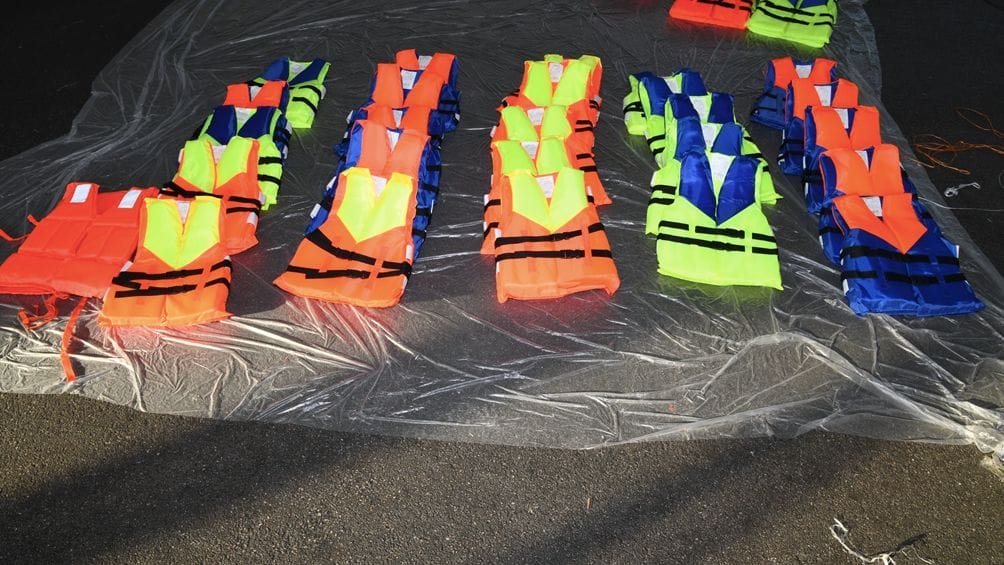 Image courtesy of NCA
Image courtesy of NCAIn 2023 the same organisation identified a location where boats and equipment were being stored by other people smugglers.
In that sting, investigators identified members of the group, and then watched as they sourced boats from Turkey (as well as engines and life jackets) taking them to the premises in Douai, a city 25 miles south of Lille. A lock-up was being used as a staging post for the crime group, who would move boats from there to the French Cote d’Opale when they were required for migrant crossings.
Prosecutors believe the group were charging migrants around 1,500 euros to cross the Channel in their boats.
Dinghy, outboard and 60 lifejackets for €15,000
The BBC latest report says that it costs €15,000 (£12,500) for the whole ‘package’: an inflatable dinghy, with outboard motor and 60 life jackets.
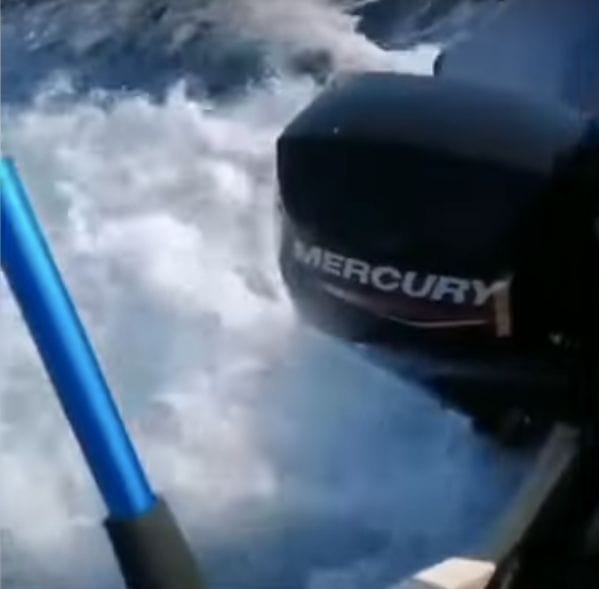 Image courtesy of footage acquired by BBC, an image of Yamaha outboards being used for people smuggling was not available
Image courtesy of footage acquired by BBC, an image of Yamaha outboards being used for people smuggling was not availableVideos were sent to the journalist, via WhatsApp, of a ‘new’ inflated dinghy, being kept in Essen. More footage includes other, similar looking, boats as well as outboard engines being fired up.
The smugglers disclosed they have about ten warehouses in the Essen area, to divide up their goods as protection against police raids.
Essen’s location near to the Channel means boats can be delivered within a morning or afternoon, should a good weather forecast prompt a surge in crossing attempts.
For about €8,000 (£6,670) the BBC’s reporter was told he could pick up the boat himself, in Essen, and drive it to northern France.
Industrialised system of people smuggling by boat
According to the Global Initiative Against Transnational Organised Crime (GIATOC) a spike in the number of arrivals to the UK can be largely explained by the ‘industrialisation’ of a system of smuggling migrants by boat, a process that began in 2018.
The report sets out how human smuggling networks have commercialised the small-boat route, keeping prices competitive and launching persuasive recruitment campaigns in migrants’ countries of origin. Operations have become more sophisticated and efficient. Smugglers manage the flow by temporarily holding migrants away from the coast, where law enforcement attention is concentrated. Once a boat or a flotilla has been dispatched, the next is prepared, reducing the time migrants spend in makeshift camps, and thus their likelihood of being apprehended. Law enforcement operations have driven innovation among smugglers, who have become adept at using small boats, from supply of the vessels to the point they are launched, and using departure points that are out of the spotlight of security agencies, says the organisation’s report, published in February 2024.
It explains that the economics of the small-boat crossing are also changing, making it a more attractive option for migrants than the truck route. Before 2018, the price of a small-boat crossing had been much higher – reportedly €14 000 per person – but two major events changed this – namely the implementation of post-Brexit border controls (raising the already high price of travelling by truck), and covid (where the number of trucks crossing plummeted).
Consequently, crossing by boat became comparatively cheaper (between £2,500 and £4,000 per person, or €3000–€4700)) than travelling by truck, where prices rose to between £20,000 and £25,000 (€23,600–€29,500) for Albanian migrants, although for other nationalities the maximum
reported price was £17,000 (€20,000). (Image below courtesy of NCA.)
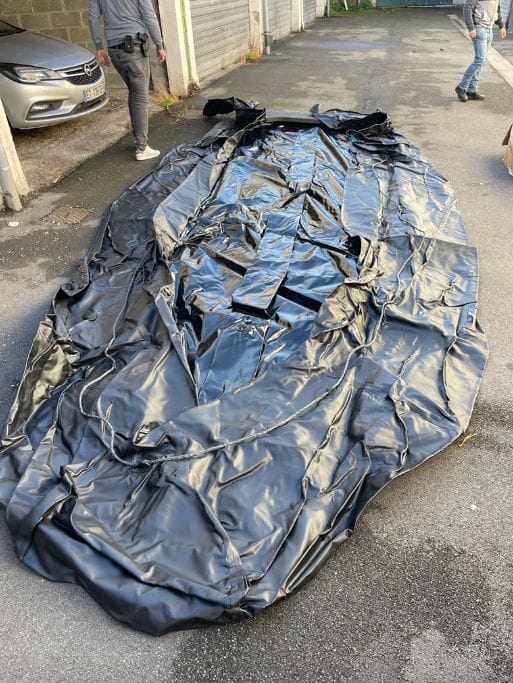
Media reports suggest there was an average of 27 people in each boat in 2021, up from 12 per boat in 2019. GIATOC says it’s now between 45 and 65 people per boat and says in the majority of cases smugglers are packing each boat with more and more people, rather than buying bigger ones.
One French coastal lifeguard told the organisation: ‘The handles come off very fast and the floor of the boat is very fragile.’
Substandard materials used in boat manufacture
Several types of inflatable boat, that are not designed or sold to carry more than a few people and never designed to tackle offshore voyages are being utilised by smugglers. According to NCA, substandard materials are often used by the smugglers to reinforce the floor (to enable the boat to carry more people), with the result that the floor sometimes gives way at sea, plunging the passengers into the water.
Chair of the National Independent Lifeboat Association, Neil Dalton, told the BBC he wouldn’t go in a “duck pond” in such vessels.
Comparing one to a “death trap”, he says it would be “appallingly dangerous” to pack dozens of people onto these boats for a Channel crossing, because of what appears to be a “tremendously flimsy” design.
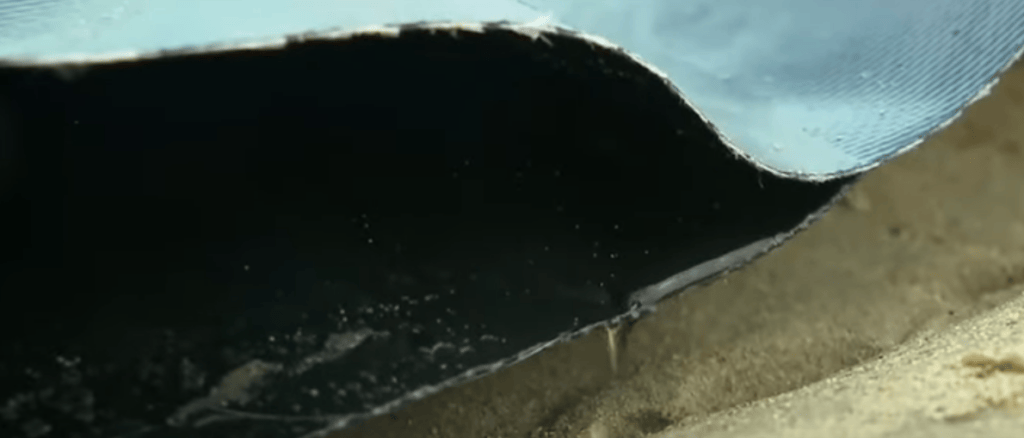 Image, showing split seam, courtesy of BBC
Image, showing split seam, courtesy of BBCIn 2021, Decathlon stopped selling canoes in Northern France to prevent migrants from attempting to use them to cross to England.
GIATOC says most of the RIBs it researched are manufactured in China. While the boats vary in size, they are usually approximately eight metres long and just under two metres wide. By 2022, the engine types commonly used were Yamabisi (30 or 40 horse power) manufactured in China and cost around €1,300. From China, the boat equipment is sent by container to Turkey and then moved to Europe.
The organisation says that in some cases, groups of boat transporters appear to provide their services to several smuggling rings. In Lille, one group of 30 predominantly French transporters composed of young people from disadvantaged neighbourhoods reportedly made an average of four boat deliveries to the coast each night in good weather. This group allegedly supplied several different networks, with a flat fee
of €200 paid per delivery of a boat. Their warehouse was shut down by French authorities in 2022.
Boating apps used by people smugglers
To monitor sea conditions in the Channel, some smugglers use an app called Windy, which provides live information on wind and weather patterns. Attempts to cross peak in the summer. When sea conditions are good – meaning the swell is below 0.7 metres and the wind below 15 knots – migrants and refugees travel to hubs around Calais and Dunkirk, says GIATOC.
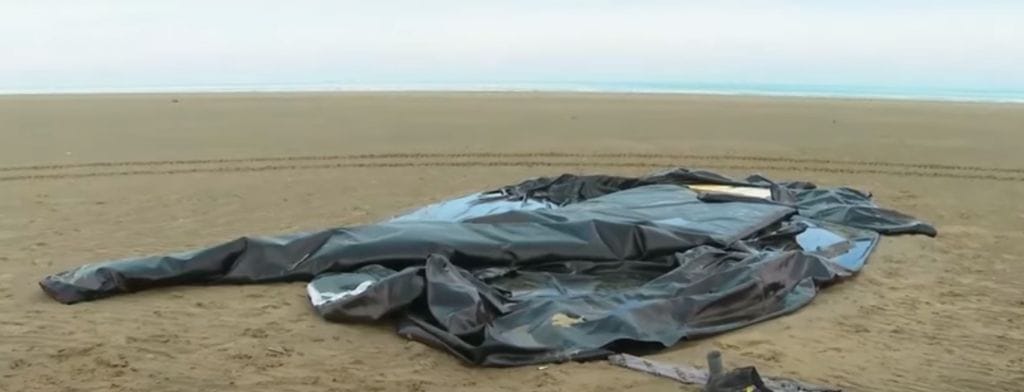 Image courtesy of BBC footage
Image courtesy of BBC footageOver the last 12 months, NCA, alongside the Home Office and FCDO, have also been working with the Bulgarian National Customs Agency and Bulgarian Border Police, sharing intelligence and mounting joint operations targeting the criminal supply chain.
As a result, 33 separate interceptions of maritime equipment intended for criminal gangs organising channel crossings have been made, including 125 inflatable boats, 128 outboard engines, more than 700 pumps, and 300 rubber rings.
NCA experts assess the seizures will have denied the crime networks around £16.6 million in profit they would have made from crossings using the equipment.
But it’s not just dinghies that are being used. In July 2023, NCA reported that eight men were arrested over an alleged people-smuggling attempt in Devon when a number of people were believed to have been brought across the Channel from France on a yacht.
The 30ft (9m) vessel was seen at Mothecombe Beach, near Kingsbridge. The group was brought to shore in a dinghy, and picked up in a black Mercedes 180. The yacht, Timberwolf, was stopped by Border Force officers as it was sailing on to Plymouth.
Appeals to the maritime industry to help thwart people smugglers
“We are directly appealing to those within the marine and maritime industries to help us stop those involved in organised people smuggling,” Bonfield said.
“Crossing the channel in vessels like these is extremely dangerous and life threatening – but the organised crime groups involved don’t care about safety or welfare, they just see migrants as a commodity to be exploited.
“We’re already working closely with a range of partners in the UK and on the continent to target the supply of these vessels, but we are now asking that the UK industry helps us and report any suspicions they may have.”
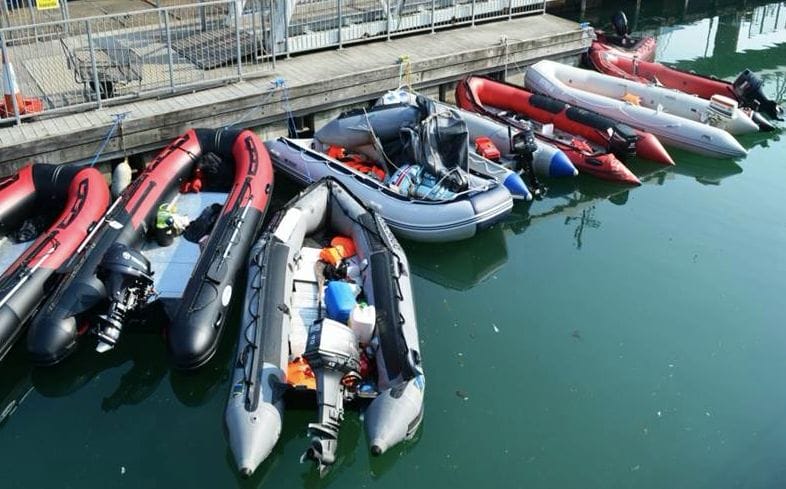 Image courtesy of NCA
Image courtesy of NCAWhat’s the solution?
GIATOC’s research has looked at how to delink organised crime from demand, and ways to ‘stop the boats’.
Simply put, the rug needs to be pulled from under demand for smugglers’ services. Migrants who cross the Channel on small boats hail from a diverse set of demographics, which can be separated into a few categories, with strategies for each.
Offering short-term or seasonal visas that are easy to renew would enable economic migrants to undertake legal work and generate legal income that could be sent home would be resource-intensive – but less so than detecting ‘invisible’ workers, says GIATOC. This model could be designed to support specific domestic labour shortages. Enabling economic workers such opportunities may also reduce the incentive to bring over families and settle in the UK, as remittances from the UK would invariably carry more purchasing power in the migrants’ country of origin.
To spare asylum seekers the difficult and dangerous journey across land and water, and Yamaha and Mercury the horror of being preferred outboards for people smugglers, these groups should be allowed to process asylum claims in safe and supportive locations closer to their country of origin, which would help prevent them from entering into the human smuggling ecosystem and allow the UK to better screen, plan for and support the transition of those deemed eligible.
Providing safe and legal routes for these two categories of migrants would significantly reduce the number of possible clients for voracious smuggling networks who are seeking a mass market to make their business model successful, concludes GIATOC.
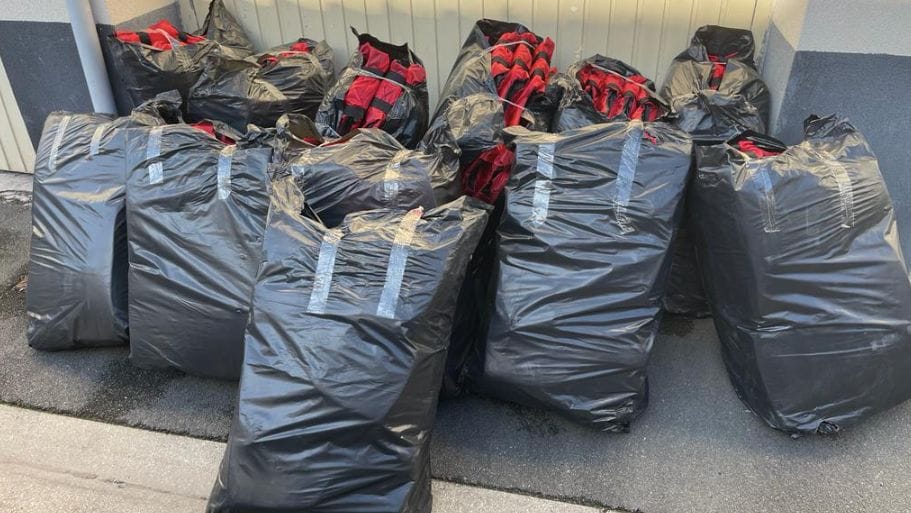 Image courtesy of NCA
Image courtesy of NCAThe post Yamaha speaks out against outboard use by people smugglers following BBC report appeared first on Marine Industry News.
